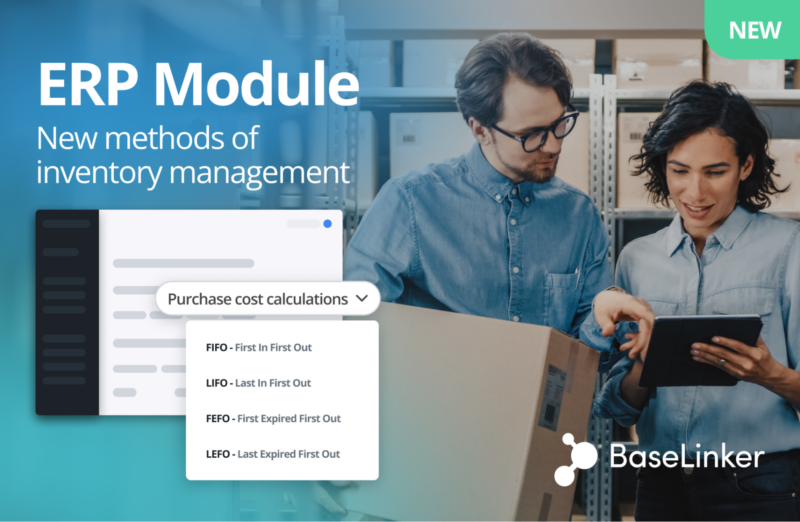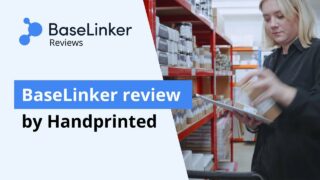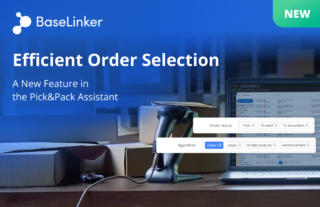
Today, we introduce long-awaited enhancements to the BaseLinker system, bringing advanced ERP functionalities. This is another step that ensures you don’t have to invest in upkeeping two distinct systems; all tasks can now be performed within BaseLinker. The new features focus on the precise tracking of product units within the warehouse, based on purchase cost accounting methods for inventory valuation such as FIFO, LIFO, FEFO, and LEFO. Here’s a detailed overview of these new additions.
Unit tracking in BaseLinker Warehouse
One of the key improvements in the BaseLinker system is unit tracking. This feature allows for precise monitoring of each product unit from the moment of delivery until sale. This solution enables not only the tracking of general product information but also the recording of individual purchase prices for each unit. This is a significant change from the previous approach, which monitored the average product cost. It also allows for the adaptation of warehouse processes to the specific requirements of different business models. Companies that need to detail the purchase costs of goods from specific deliveries or track product expiration dates will find this feature very helpful.
New inventory management methods
The new ERP functions in BaseLinker introduce the possibility of using various inventory management approaches with popular methods such as FIFO, LIFO, FEFO, and LEFO. What distinguishes them?
- FIFO (First In, First Out) – This method assumes that the products first received in the warehouse are also the first sold. This allows for precise tracking of which units and at what price were purchased first, which is crucial for cost calculation and inventory valuation. Mainly, FIFO is used in preparing accounting documentation. Many accounting offices, especially in companies using so-called full accounting books, need this model of settlement. It allows for efficient cost accounting and document preparation according to requirements.
- LIFO (Last In, First Out) – In this case, the most recent products, i.e., the last received in the warehouse, are sold first. This is a less commonly used method but can be beneficial in certain conditions, such as industries where product prices change rapidly.
- FEFO (First Expired, First Out) – This method focuses on product expiration dates. Products with the shortest shelf life are sold first, minimizing the risk of product expiration. This is particularly important in the food and pharmaceutical industries.
- LEFO (Last Expired, First Out) – The opposite of the FEFO method. Products with the longest shelf life are sold first. This method is less popular but can be useful in specific cases, such as when it is necessary to extend the storage time of certain batches of goods.
How to enable these features in BaseLinker’s Panel?
To enable purchase cost control, go to Products, Settings, Inventories and select Edit for the inventory your products are in.
Then navigate to the Purchase Cost Accounting options.
Important! To make the FIFO/LIFO/FEFO/LEFO cost accounting options visible, you must block negative stock levels (Negative stock levels → Block negative stock levels) and enable Strict Warehouse Control (Storage documents – strict control → Yes). This module also includes several other useful options, such as avoiding negative stock levels, introducing strict SKU uniqueness control, and handling warehouse documents. Read about all the possibilities of Inventory Control in BaseLinker.
New options for purchase orders
We have also introduced new possibilities in managing purchase orders. Want to know more about purchase orders in BaseLinker? Read the Purchase Orders guide in our Knowledge Base.
Expiration date handling
When creating a new delivery, you can, in addition to the purchase price, enter product expiration dates, which allows for better inventory management and minimizing losses due to expiration. Entering the expiration date upon delivery is not required – you can fill in this information at any time.
Purchase price and product cost division
Ability to record different purchase prices for individual units within a single delivery. This is essential when products within one delivery have been purchased at different prices. The system allows splitting the delivery into units with different purchase prices (using the “Split” button). This function allows for precise cost allocation to individual product units, which increases calculation accuracy and helps in accountancy. Although the averaged cost of purchased goods is acceptable in tax calculations, accountants prefer this method of assigning prices to individual units.
Example of practical application of new features
Let’s assume a company receives a delivery of 10 units of a product at a price of 10 GBP per unit, and a week later another delivery of the same product, but at a price of 12 GBP per unit. Thanks to the unit tracking feature in BaseLinker, this company can precisely monitor which units were purchased at what price. When a customer orders a product, the system automatically assigns the purchase cost according to the selected method, e.g., FIFO. As a result, the company will first sell the units bought for 10 GBP, and only then those bought for 12 GBP, providing precise cost data.
What does this mean for You?
The new ERP features in BaseLinker bring many benefits:
- Greater control over inventory from delivery to sale – Unit tracking allows for precise inventory management and accurate monitoring of goods movement.
- Order in accounting and warehouse documents – Strict record of each product unit ensures no unit goes unnoticed, facilitating documentation.
- Savings through better purchase price management – The ability to accurately assign costs to individual units allows for more precise price calculations and better financial management.
- Fewer losses due to expiration date monitoring – Thanks to the FEFO and LEFO methods, products with the shortest shelf life are sold first, minimizing the risk of goods expiration.
ERP Module in BaseLinker – summary
We strive to ensure that BaseLinker offers integrated solutions, eliminating the need to pay for, implement, and use separate ERP, WMS, and PIM systems. The new ERP features in the BaseLinker system allow sellers to manage inventory more accurately from delivery to sale, ensuring precise tracking and monitoring of goods movement. Improved recording of each product unit facilitates accurate accounting and warehouse documents, minimizing the risk of errors and omissions. Additionally, the ability to detail purchase costs for individual units allows for price optimization and better financial management.
We encourage you to test the ERP module, which will allow for more precise resource management, minimize losses, and control costs, undoubtedly translating into improved operational and financial efficiency.


